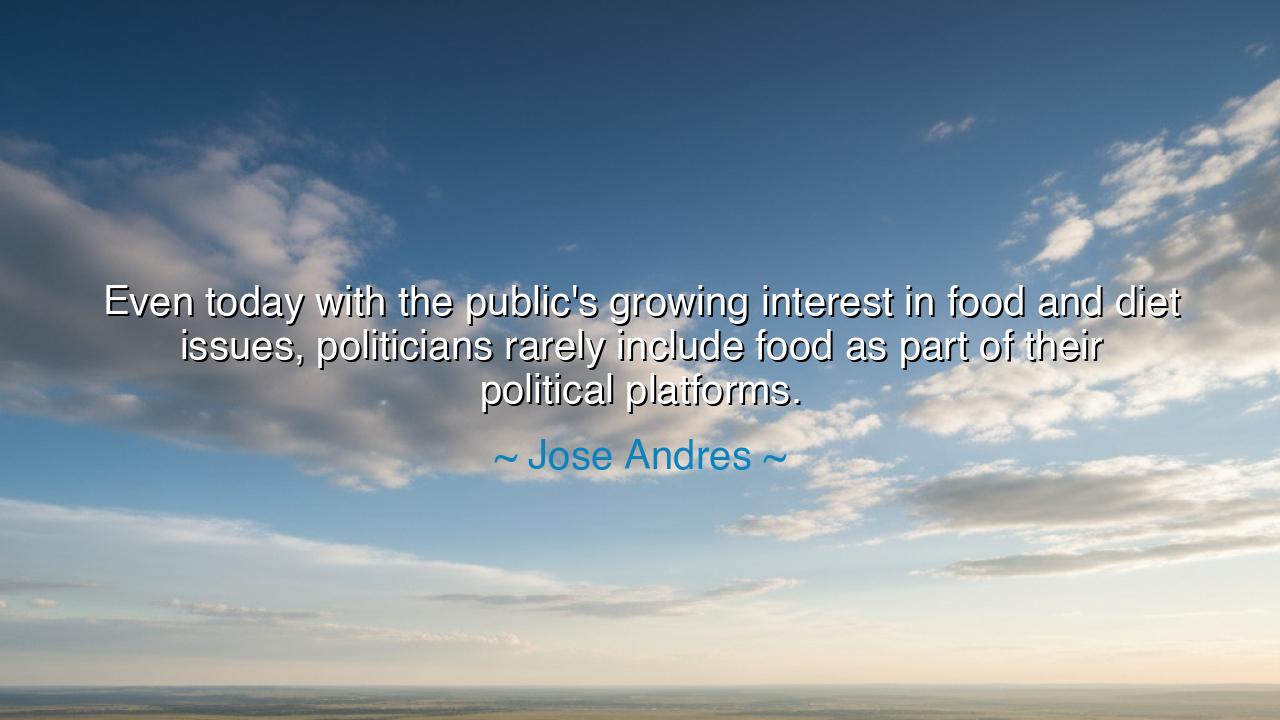
Even today with the public's growing interest in food and diet
Even today with the public's growing interest in food and diet issues, politicians rarely include food as part of their political platforms.






The words of José Andrés, “Even today with the public's growing interest in food and diet issues, politicians rarely include food as part of their political platforms,” strike not only as a commentary on governance, but as a lamentation — a cry that echoes through the ages. For in these words lies the reminder that food is not merely nourishment; it is civilization itself. It is the foundation upon which kingdoms rise and fall, the silent force that shapes the destiny of nations. Yet, as Andrés observes, even in an age of enlightenment, when the people hunger for health and sustainability, those who wield power remain blind to the truth that the politics of food are the politics of life.
In the ancient world, the wise knew this well. To them, food was sacred — a covenant between humanity and the earth. The Pharaohs of Egypt, the emperors of China, and the rulers of Rome all understood that to govern wisely, one must first feed wisely. The Roman poet Juvenal wrote, “Give them bread and circuses,” for he knew that the stability of empire depended on bread as much as on armies. When the grain ships failed to arrive in the harbors of Rome, the city itself trembled. And yet, how quickly the lessons of the past are forgotten! Today, we debate wealth, war, and technology, but seldom do we speak of food — the soil beneath all these concerns, the measure of both our health and our humanity.
José Andrés, a chef who has fed the hungry not for profit but for principle, understands this ancient truth: that food is the most basic form of justice. When food is unequally distributed, so too is opportunity. When it is poisoned by greed or neglect, so too is the body of the nation. And yet, as he points out, those who craft laws and shape destinies rarely see it so. They treat food as an afterthought — a private matter of appetite — rather than the public matter of survival and dignity that it truly is. This blindness is not just political; it is moral. It is the same blindness that allowed empires to starve while their palaces feasted.
Consider the story of France before the Revolution, when bread — that simplest and most essential of foods — became the symbol of all injustice. While the wealthy dined on delicacies, the poor could not afford a loaf. “Let them eat cake,” legend says the queen replied, and with those words the fate of the monarchy was sealed. It was not swords that began the French Revolution, but hunger. Food, neglected by the rulers, became the spark of change. In this, history speaks with the same voice as Andrés: those who ignore the politics of the table will one day face the politics of the street.
And yet, there is hope — for food, as Andrés has shown through his work with World Central Kitchen, has the power not only to destroy but to heal. In times of disaster, when governments falter and systems fail, the act of feeding others becomes a form of leadership greater than any speech or decree. A bowl of soup in a time of chaos restores not only the body but the bond between people. Andrés reminds us that to include food in the political vision of a nation is to embrace compassion as policy, to recognize that true strength lies not in wealth or weapons, but in the ability to nourish life.
The ancient Greeks saw hospitality, or xenia, as sacred — the act of feeding a stranger was a duty to the gods. Today, that same spirit demands that leaders see food not as an economic commodity, but as a moral responsibility. When fields are poisoned, when children go hungry, when farmers are broken by profit and waste, the soul of a nation weakens. To make food part of our politics is not to cheapen politics — it is to elevate it. It is to remember that governance began not in palaces but around the fire, where communities first shared bread and spoke of justice.
Let this, then, be the teaching: honor food as you would honor life itself. Demand of your leaders that they feed wisely, that they see agriculture, health, and sustainability not as separate issues but as one sacred chain. Support those who till the soil, and give voice to those who hunger. For the measure of a civilization is not in its monuments or its machines, but in how it feeds its people — and in how it respects the earth that feeds them in turn.
For as José Andrés reminds us, no nation can claim greatness if it neglects its own table. Food is not a luxury of the few, but the birthright of all. It is the truest test of leadership and the purest form of love. And when the day comes that every platform, every policy, and every purpose begins with the question, “Who will we feed, and how shall we feed them?” — only then will humanity stand again in harmony with the wisdom of the ancients, and the world shall be nourished in both body and spirit.






AAdministratorAdministrator
Welcome, honored guests. Please leave a comment, we will respond soon